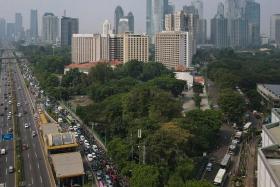Bombs in Jakarta blasts were made from pressure cookers
Jakarta blasts kill three policemen, wound 10
INDONESIA: As Indonesia's anti-terrorism unit raided the home of a suspected suicide bomber yesterday, more details have emerged on the type of bombs used to kill three Indonesian policemen on duty at a Jakarta bus terminal on Wednesday night.
Pressure cookers, filled with explosive materials, nails and buckshots, were in the device used by suicide bombers in the twin blasts that went off five minutes apart, Reuters reported.
Ten people, including five police officers and five civilians, were also wounded in the blasts.
National Police spokesman, Inspector General Setyo Wasisto, told kompas.com yesterday: "Based on the crime scene investigation, two of the perpetrators carried the pressure cooker bombs in their carrier bags.
"We found (pieces of) nails and buckshot in the pressure cooker."
Police yesterday also said they believed the killers had links to Islamic State in Iraq and Syria (ISIS)."We must continue to keep calm (and) keep cool," President Joko Widodo said in a statement.
"Because ... we Muslims are preparing to enter the month of Ramadan for fasting."
The director of the Jakarta-based Institute for Policy Analysis of Conflict (IPAC), Ms Sidney Jones, said the police had been seen as protectors of a "thogut" state that rejects application of Islamic law.
WORSHIP
In Islamic theology, thogut refers to those who worship anything other than Allah, the Jakarta Post reported.
"The police are the ones who arrest mujahideen (one who engages in jihad) and sometimes kill them in operations...," she said yesterday.
She said the purpose of the attack was also to show their presence following numerous police actions in past years that had weakened terrorist groups in the country.
The country has suffered a series of mostly low-level attacks by ISIS sympathisers in the past 17 months.
But authorities are increasingly worried about a surge in radicalism, driven in part by a new generation of militants inspired by ISIS.
"After what happened in Manchester, in Marawi in the Philippines, maybe the cells here were triggered by the bombs and that lifted their passion to start bombing again," Mr Setyono told television station TVOne.
A suicide bomber killed 22 people in a crowded concert hall in Manchester this week.
In the southern Philippines, thousands of civilians in Marawi city fled their homes this week after Islamist militants took over large parts of the city, leading to a declaration of martial law.
Get The New Paper on your phone with the free TNP app. Download from the Apple App Store or Google Play Store now



